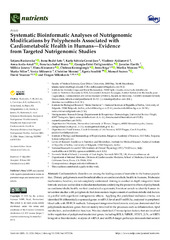Приказ основних података о документу
Systematic Bioinformatic Analyses of Nutrigenomic Modifications by Polyphenols Associated with Cardiometabolic Health in Humans—Evidence from Targeted Nutrigenomic Studies
| dc.creator | Ruskovska, Tatjana | |
| dc.creator | Budić-Leto, Irena | |
| dc.creator | Corral-Jara, Karla Fabiola | |
| dc.creator | Ajdžanović, Vladimir | |
| dc.creator | Arola-Arnal, Anna | |
| dc.creator | Bravo, Francisca Isabel | |
| dc.creator | Deligiannidou, Georgia-Eirini | |
| dc.creator | Havlik, Jaroslav | |
| dc.creator | Janeva, Milkica | |
| dc.creator | Kistanova, Elena | |
| dc.creator | Kontogiorgis, Christos | |
| dc.creator | Krga, Irena | |
| dc.creator | Massaro, Marika | |
| dc.creator | Miler, Marko | |
| dc.creator | Milošević, Verica | |
| dc.creator | Morand, Christine | |
| dc.creator | Scoditti, Egeria | |
| dc.creator | Suárez, Manuel | |
| dc.creator | Vauzour, David | |
| dc.creator | Milenković, Dragan | |
| dc.date.accessioned | 2021-08-12T11:05:04Z | |
| dc.date.available | 2021-08-12T11:05:04Z | |
| dc.date.issued | 2021 | |
| dc.identifier.issn | 2072-6643 | |
| dc.identifier.uri | http://rimi.imi.bg.ac.rs/handle/123456789/1147 | |
| dc.description.abstract | Cardiometabolic disorders are among the leading causes of mortality in the human population. Dietary polyphenols exert beneficial effects on cardiometabolic health in humans. Molecular mechanisms, however, are not completely understood. Aiming to conduct in-depth integrative bioinformatic analyses to elucidate molecular mechanisms underlying the protective effects of polyphenols on cardiometabolic health, we first conducted a systematic literature search to identify human intervention studies with polyphenols that demonstrate improvement of cardiometabolic risk factors in parallel with significant nutrigenomic effects. Applying the predefined inclusion criteria, we identified 58 differentially expressed genes at mRNA level and 5 miRNAs, analyzed in peripheral blood cells with RT-PCR methods. Subsequent integrative bioinformatic analyses demonstrated that polyphenols modulate genes that are mainly involved in the processes such as inflammation, lipid metabolism, and endothelial function. We also identified 37 transcription factors that are involved in the regulation of polyphenol modulated genes, including RELA/NFKB1, STAT1, JUN, or SIRT1. Integrative bioinformatic analysis of mRNA and miRNA-target pathways demonstrated several common enriched pathways that include MAPK signaling pathway, TNF signaling pathway, PI3K-Akt signaling pathway, focal adhesion, or PPAR signaling pathway. These bioinformatic analyses represent a valuable source of information for the identification of molecular mechanisms underlying the beneficial health effects of polyphenols and potential target genes for future nutrigenetic studies. | |
| dc.publisher | MDPI | |
| dc.relation | European Cooperation in Science and Technology | |
| dc.rights | openAccess | |
| dc.rights.uri | https://creativecommons.org/licenses/by/4.0/ | |
| dc.source | Nutrients | |
| dc.subject | cardiometabolic health | |
| dc.subject | human | |
| dc.subject | integrative bioinformatics | |
| dc.subject | nutrigenomics | |
| dc.subject | polyphenols | |
| dc.subject | systematic literature search | |
| dc.title | Systematic Bioinformatic Analyses of Nutrigenomic Modifications by Polyphenols Associated with Cardiometabolic Health in Humans—Evidence from Targeted Nutrigenomic Studies | |
| dc.type | article | |
| dc.rights.license | BY | |
| dc.citation.issue | 7 | |
| dc.citation.spage | 2326 | |
| dc.citation.volume | 13 | |
| dc.identifier.doi | 10.3390/nu13072326 | |
| dc.identifier.fulltext | http://rimi.imi.bg.ac.rs/bitstream/id/2458/Systemati_Bioinformatic_Analyses_pub_2021.pdf | |
| dc.type.version | publishedVersion |

